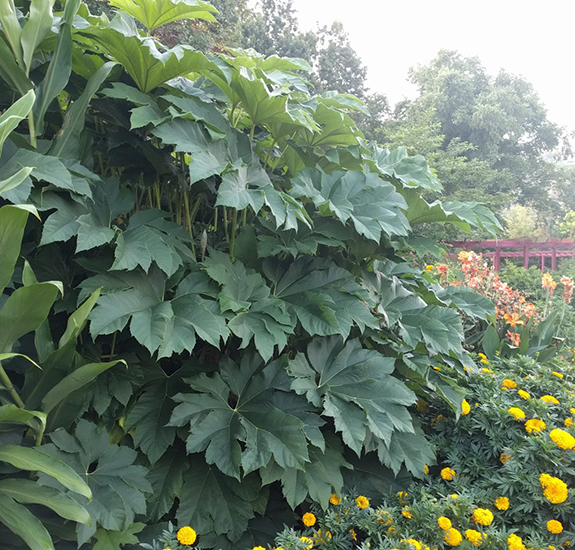| |
UT Gardens’ August 2017 Plant of the Month: Rice Paper Plant
By Alexandria Smith
UT Gardens Knoxville Horticulturist and Collections Manager

Tetrapanax papyrifer ‘Steroidal Giant’ is seen towering over marigolds in a trial bed at the UT Gardens, Knoxville. The giant leaves make an exceptional background for low-growing plants of any color. Photo by A. Smith, courtesy UTIA.
|
|
As you peruse through the vibrantly colored annual trial beds of the UT Gardens, Knoxville, there is an abundance of visual delight. However, the one thing that always makes me pause in awe is the giant exotic-looking foliage of Tetrapanax papyrifer ‘Steroidal Giant,’ commonly known as rice paper plant.
Native to the swampy forests of Taiwan, this tropical can be used to make rice paper veneer sheets, artificial flowers, and is commonly utilized in traditional Chinese pharmacopeia to treat various ailments. While evergreen in zones 8 to 11, in Knoxville the rice paper plant behaves like an herbaceous perennial with hardy roots and frost-sensitive stems that die back when temperatures fall below freezing.
Copper-colored pubescent stems are adorned with oversized, deeply lobed gray-green leaves that can grow up to 3 feet wide. In the fall small white flowers rise above the foliage on a multiple-branch panicle and are pollinated by bees. Once established, rice paper plant can reach up to 15 feet in height with an equal spread within a growing season. It can be used as a lush background in mixed borders, along walls, or used as a screening plant. At the UT Knoxville location, the plant is located in one of the annual trial beds where the dramatic foliage adds intense contrast to lower-growing flowering annuals. The UT Gardens, Jackson, location has a showy specimen in their courtyard that welcomes visitors. It is also more easily contained and managed.
Both locations have the cultivar ‘Steroidal Giant’ that features a large clumping growth habit. Other noteworthy cultivars of rice paper plant include ‘Rex’ and ‘Empress’. ‘Rex’ forms clumps about half the size of ‘Steroidal Giant’ and ‘Empress’ is more tree forming with fewer suckers. When selecting a site, I recommend using ‘Steroidal Giant’ for larger areas where it has enough room to grow and fill in. Cultivars ‘Rex’ and ‘Empress’ are better suited for smaller sites such as in garden beds or in borders. These great selections can add outstanding texture and a huge “wow” factor to your garden.
Rice paper plant is not threatened by serious diseases or pests that persist; however, prolific suckering can be problematic if the plant is not maintained or if site selection was not considered. Rice paper plant spreads via underground rhizomes that can reach up to 10 feet from the original plant. These can be easily pulled up and removed to reinforce desired planting perimeter. When handling plant materials, gloves and a mask may be required as the pubescence that covers stems and leaves can irritate eyes and skin if disturbed.
Rice paper plant should be planted during late spring in rich, moist soil in conditions that range from full sun to partial shade. Be cautious of planting close to smaller plants as they may get shaded out or taken over by the vigorous growth of rice paper plant. A thick layer of mulch should be added in the fall to provide roots protection during winter.
The UT Gardens includes plant collections located in Knoxville, Jackson and Crossville. Designated as the official botanical garden for the State of Tennessee, the collections are part of the UT Institute of Agriculture. The Gardens’ mission is to foster appreciation, education and stewardship of plants through garden displays, educational programs and research trials. The Gardens are open during all seasons and free to the public. For more information, visit the Gardens website: ag.tennessee.edu/utg.
Published August 11, 2017 |

